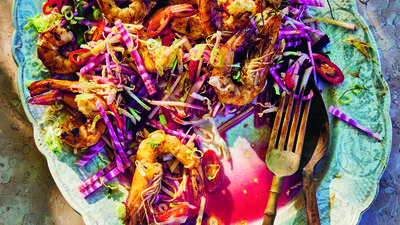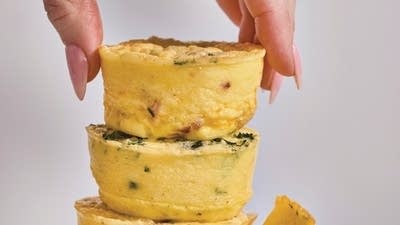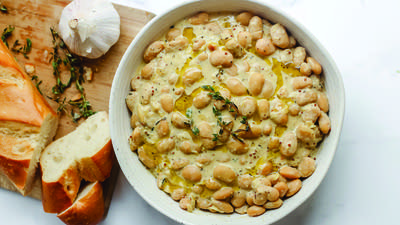From The Elements of Cooking: Translating the Chef's Craft for Every Kitchen by Michael Ruhlman (Scribner, 2007). Copyright 2007 by Michael Ruhlman.
Yield: 2 quarts brown veal stock
Ingredients
4 pounds of meaty veal bones and veal joints cut into three inch pieces, blanched or roasted (see below for method)
4 quarts cold water
1/2 pound leeks
1 pound onions, chopped
1/2 pound carrots, chopped
1/2 pound celery, chopped
1/2 head of garlic (five to ten cloves)
2 tablespoons tomato paste
Small bunch thyme
Small bunch parsley
1 bay leaf
1 teaspoon black peppercorns, crushed with the bottom of a small sauté pan
Instructions
1. Combine the cooked bones and water in a pot and bring to a simmer. Reduce the heat so that the water stays just below a simmer, about 180 F; or place, uncovered, in an oven preheated to between 190 F and 200 F, and cook for about 10 hours. Add the remaining ingredients, bring the water temperature back up to just below simmering and cook for one more hour. Strain out the bones and vegetables, and pass the stock through a kitchen cloth or cheese cloth.
2. This stock can be used as is as a braising liquid (lamb shank! short ribs!) or to enrich stews and legumes and soups. Or it can be reduced to one quart and used as a sauce base (i.e. added to sautéed mushrooms and shallots, added to shallots, wine and mustard, etc.)
For White Veal Stock:
1. Combine the bones and the water in a large pot and bring the water up to a full boil over high heat. Strain the bones then rinse them well under cold water.
For Brown Veal Stock:
1. Preheat the oven to 450 F. Lightly oil a roasting pan or sheet tray large enough to contain the bones without crowding them. Roast in the oven, turning occasionally, until they are appealingly browned and smell delicious. They'll lose about a third of their weight and the stock will be especially flavorful.
Before you go...
Each week, The Splendid Table brings you stories that expand your world view, inspire you to try something new, and show how food connects us all. We rely on your generous support. For as little as $5 a month, you can have a lasting impact on The Splendid Table. And, when you donate, you’ll join a community of like-minded individuals who love good food, good conversation, and kitchen companionship. Show your love for The Splendid Table with a gift today.
Thank you for your support.
Donate today for as little as $5.00 a month. Your gift only takes a few minutes and has a lasting impact on The Splendid Table and you'll be welcomed into The Splendid Table Co-op.




